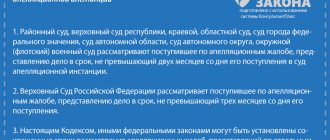Instructions: how to draw up a cassation appeal
To the Fourth Court of Cassation of General Jurisdictionaddress: 350906, Krasnodar, st. Morskaya, 3
Applicant for the complaint, plaintiff: State budgetary educational institution
additional education for children
specialized children's and youth sports school of Olympic reserve "Allur"
GBOU DOD SDYUSSHOR "ALLUR"
Address: Moscow, 3rd budget passage, 1
Defendant: Viktorova Victoria Viktorovna
Rostov-on-Don, st. Profitable, 2-2
Case No. 88-222/2021
Appeal
On December 11, 2021, the Sovetsky District Court of Rostov-on-Don made a decision in a civil case in the lawsuit of the State Budgetary Educational Institution of Children's and Youth Sports School "ALLUR" against V.V. Viktorova. on debt collection under a loan agreement. The court's decision rejected the claims in full.
This decision was appealed to the appellate court. By the decision of the Third Court of Appeal, the decision of the first instance court was left unchanged, and the appeal was not satisfied.
We believe that when issuing the above judicial acts, the norms of substantive law were significantly violated and were interpreted incorrectly.
In addition, the conclusions of the courts of first and appellate instances do not correspond to the actual circumstances of the case.
Viktorova V.V. funds were received in the amount of 50,000 rubles and 30,000 rubles, which is confirmed by receipts dated 10.10.2020 and dated 10.22.2020. In accordance with the text of these documents, the funds should have been returned on October 20, 2020. However, Viktorova V.V. I returned the money only partially, in the amount of 3,000 rubles. The rest of the debt has not yet been repaid. The original receipts are in this case.
According to the text of the receipts, Viktorova V.V. undertakes to return the money, the defendant wrote these receipts in her own hand, affixed her signature, and did not challenge them in court, as well as the obligations to return.
Since Viktorova V.V. received these funds without the grounds provided for by law, then she is obliged to return them as unjust enrichment. The violation of the plaintiff’s rights consists in the fact that he is deprived of funds, the circumstances on which the claims are based are receipt of unjust enrichment, receipts are evidence, they confirm the existence of legal relations and a violation of the plaintiff’s rights.
The courts stated in their decision that they did not provide evidence of the validity of the plaintiff’s claims. We believe that this assertion is unfounded; the evidence is available in the case materials.
Written, documentary evidence and receipts are provided. They confirm the main thing that there are obligations that have not been fulfilled. The amount is indicated, the defendant’s signature is present, documents were drawn up in front of witnesses. Viktorova V.V. signed that she undertakes to return the funds.
The circumstances of the transfer of money are established from the accompanying facts. Thus, there is information about the initiation of a criminal case regarding the theft from the State Budget Educational Institution of Children and Youth Sports School "ALLUR" by teacher V.V. Viktorova. money, about writing receipts right in the court corridor before the court hearing of V.V. Viktorova. that she owes funds from the State Budget Educational Institution DoD SDYUSSHOR "ALLUR", with lawyer A.A. Zimin as a witness. This was followed by the filing of an application to terminate the criminal case due to reconciliation. There is an order to deposit funds into the legal entity's cash register. All these circumstances are established in the case materials and the court decision. But it is indicated that the conditions for providing funds are not specified. We believe that the conditions and fact of the transfer of funds are proven by all the collected materials.
From the totality of the data, it becomes clear why the funds were transferred; their transfer is confirmed.
Based on the above, guided by Articles 376, 379.7, 390 of the Civil Procedure Code of the Russian Federation,
Ask:
Cancel the court decisions, make a new decision without sending the case for a new trial and satisfy the claims.
List of attached documents (originals):
- Documents confirming the sending of the cassation appeal to other persons participating in the case - 1 copy.
- Document confirming payment of the state duty (3,000 rubles for legal entities) - 1 copy.
- A document confirming the powers of the director (minutes, order, extract from the Unified State Register of Legal Entities).
March 17, 2021
Signature of the applicant (plaintiff): Director Ivanov I.I. Ivanov
How to draw up a cassation appeal in a civil case
To prepare a cassation appeal, it is necessary to obtain certified copies of the court's decision and ruling. The applicant attaches them to the complaint. Otherwise, the court will not accept the documents for production.
The header of the complaint states:
- name of the cassation authority, i.e. the court that is authorized to consider the complaint;
- information about the initiator of the complaint: last name, first name, patronymic, address, as well as procedural status (plaintiff, defendant, third party);
- a list of all persons participating in the case, indicating their full name, address of residence, and procedural status.
The text of the complaint must contain: the name of the court that considered the case on the merits, a summary and date of the decision, the name of the appellate court, the date and content of the appeal ruling (result).
Mandatory: what norms of substantive or procedural law were violated during the resolution of the case or during the appeal, as well as which court rulings (decisions) are subject to cancellation for this reason.
In cassation, you can appeal those court rulings against which it is impossible to file a private complaint, for example, refusals on applications to challenge a judge, to involve a third party, etc.
If a person did not participate in the case, and the court decision had an impact on his rights and obligations (and such persons have the right to file a cassation appeal), it is mandatory to indicate which rights were violated.
A cassation appeal in a civil case must end with the applicant’s request: to cancel the decision of the court of 1st instance in whole or in part, to change the court decision due to a violation of substantive rules of law, etc. Read more in Article 390 of the Code of Civil Procedure of the Russian Federation.
Cassation appeal against the decision of the arbitration court: professionalism above all
What would have to happen for the judges in the Court of Cassation to consider the decision of their junior colleagues a miscarriage of justice?
What knowledge is required for a person filing a cassation appeal against a decision of an arbitration court in order to prove this mistake to them?
To point out someone's mistake, you must have knowledge at least as good as the person whose position you are challenging
When filing a cassation appeal against a decision of an arbitration court, it is necessary to reasonably question the application of substantive or procedural law by the arbitration and (or) appellate court.
Four attributes of a cassation appeal
- Professional language and clear presentation
- Strong argumentation and valid arguments
- Correct interpretation and application of legislation
- Compliance of the position with judicial practice
Cassation appeal - impeccability in written rhetoric and semantic load
Basic or superficial knowledge of jurisprudence is not enough
Moreover, there is no need to talk about situations when a cassation appeal is written by a person far from the field of law.
Right of appeal under the Arbitration Procedure Code of the Russian Federation
Arbitration provides for the possibility of sequentially appealing to cassation authorities at different levels, that is, two-stage cassation. Chapter 35 of the Arbitration Procedure Code of the Russian Federation regulates the right and stages of appeal:
- first stage – Art. Art. 273-291 Arbitration Procedure Code of the Russian Federation;
- second stage – Art. Art. 291.1-291.15 Arbitration Procedure Code of the Russian Federation.
The fundamental differences between the first and second stages of cassation are: the ordinary procedure for filing a complaint and the presence of district arbitration courts in the first stage, filtering of cases in the second.
The ordinary nature of the review is that to initiate cassation proceedings it is sufficient to file a complaint with the district court. They revise:
- writs, since there is no need for an appeal;
- acts of the courts of first instance that passed the appeal;
- judgment of the court of appeal;
- decision of the court on intellectual property rights in the first instance.
The second stage or “second cassation” includes the Judicial Collegium for Economic Disputes of the Supreme Court of the Russian Federation (SC RF). It appeals against acts of the courts of the first level.
Important. To appeal to the Supreme Court, you must go through the courts of the first stage of cassation.
The consideration of a complaint by the Supreme Court takes place in two stages - not all cases are allowed to be considered, that is, cases are filtered.
Stages of cassation proceedings
A cassation appeal is filed through the arbitration court that made the decision
- in writing and signed by the person filing the complaint or his authorized representative to sign the complaint, or
- by filling out a form posted on the official website of the arbitration court on the Internet.
More information about the cassation appeal
Contents of the cassation appeal:
- name of the arbitration court to which the cassation appeal is filed;
- the name of the person filing the complaint, indicating his procedural position, as well as other persons participating in the case, their location or place of residence;
- name of the arbitration court that adopted the appealed decision, resolution, case number and date of adoption of the decision, resolution, subject of the dispute;
- the requirements of the person filing the complaint to verify the legality of the appealed judicial act and the grounds on which the person filing the complaint is appealing the decision, resolution, with reference to laws or other regulatory legal acts, the circumstances of the case and the evidence available in the case;
list of documents attached to the complaint.
The cassation appeal may also indicate telephone numbers, fax numbers, e-mail addresses and other information necessary for consideration of the case, and existing petitions may be submitted.
The person filing a cassation appeal is obliged to send to other persons participating in the case copies of the cassation appeal and the documents attached to it, which they do not have, by registered mail with return receipt requested, or hand them over to other persons participating in the case or their representatives personally against signature.
The following are attached to the cassation appeal:
- a copy of the appealed judicial act;
- documents confirming the payment of the state duty in the established manner and amount or the right to receive a benefit in the payment of the state duty, or a petition for a deferment, installment payment of the state duty, or a reduction in its amount;
- documents confirming the sending or delivery to other persons participating in the case, copies of the cassation appeal and documents that they do not have;
a power of attorney or other document confirming the authority to sign the cassation appeal.
Documents attached to the cassation appeal may be submitted to the arbitration court in electronic form.
According to Art. 278 of the Arbitration Procedure Code of the Russian Federation, a cassation appeal, filed in compliance with the requirements set by the Code for its form and content, is accepted for proceedings by the arbitration court of the cassation instance. After which the arbitration court can:
- leave the complaint without action;
- return the complaint;
- terminate the complaint proceedings;
- consider the case in the cassation court.
The issue of accepting a cassation appeal for the proceedings of the arbitration court of the cassation instance is decided by the judge alone within 5 days from the date of its receipt by the arbitration court of the cassation instance.
The arbitration court issues a ruling on accepting a cassation appeal for proceedings, which initiates proceedings on a cassation appeal.
Elements of the basis for initiating cassation proceedings
Elements of the basis for initiating cassation proceedings:
- filing a cassation appeal;
- whether the applicant has the status of a subject of review - a person entitled to cassation appeal;
- the existence of the object of review - a judicial act subject to cassation review (including its entry into legal force);
- compliance with the conditions of the appeal - requirements for the form and content of the cassation appeal, the deadline for filing it or applying for restoration of the missed deadline, the procedure for filing a complaint.
The ruling shall indicate the time and place of the court hearing to consider the cassation appeal. In this case, the time for the first court hearing to consider a cassation appeal is determined taking into account the fact that it cannot be scheduled earlier than the expiration of the period established by this Code for filing a cassation appeal.
Copies of the ruling on acceptance of the cassation appeal are sent to the persons participating in the case no later than the next day after the day it is issued.
Feedback on the cassation appeal
A person participating in the case sends a response to the cassation appeal with attached documents confirming objections to the complaint to other persons participating in the case and to the arbitration court (Article 279 of the Arbitration Procedure Code of the Russian Federation).
The response sent to the arbitration court is also accompanied by a document confirming the sending of the response to other persons participating in the case.
The review is sent by registered mail with acknowledgment of receipt within a period that provides the opportunity to familiarize yourself with the review before the start of the court hearing.
The review is signed by the person participating in the case or his representative. The review signed by the representative is accompanied by a power of attorney or other document confirming his authority to sign the review.
The review may be submitted to the arbitration court by filling out a form posted on the official website of the arbitration court considering the case on the Internet. Documents attached to the response may be submitted to the arbitration court in electronic form.
Leaving a case idle
The complaint remains without progress if the requirements for its form and content provided for by the procedural law are violated. Technical errors are often the reason for leaving a complaint without progress.
Before submitting documents for consideration, you should:
- check the signatures carefully;
- certify all copies;
- attach copies of receipts for sending documents to persons participating in the process, etc.
The absence of such a “trifle” as a receipt for payment of state fees, for example, may serve as a basis for not considering a complaint until the identified deficiencies are eliminated.
In this regard, a determination is made, which indicates the types of violations and the period within which they must be eliminated.
Filing a cassation appeal to the court
A party to the case files a cassation appeal in a civil case through the court of first instance. And he addresses it to the cassation court. In this case, it is necessary to provide copies (of both the complaint and all attachments) to the persons participating in the case. The authorized court is determined based on the rules of jurisdiction when filing a statement of claim, taking into account the appellate instance.
If the case was initially considered by a magistrate, the appeal took place in the district court, and also when the appeal was considered by the court of a constituent entity of the Russian Federation, the Presidium of the court of a constituent entity of the Russian Federation is authorized to consider cassation appeals.
The procedure for the court to accept a cassation appeal in a civil case and the procedure for its consideration is covered in detail in the article “cassation appeal”.
Submission order
It is easy to determine which court to file a cassation appeal with. The decision of the appellate instance specifies the court of cassation whose jurisdiction extends to the given territory.
A cassation appeal is filed through the court that made the decision in the case. The latter sends the case and the cassation appeal (in the original) to the district arbitration court within 3 days from the date of receipt.
First cassation
The right to file the “first” cassation arises when a decision has been made in the case, an appeal has taken place and the decision has entered into legal force. Cases are considered by arbitration courts of the constituent entities of the Russian Federation, assigned in the list to a specific territory. If the decision in the case does not suit any of the parties, the right to file a “second” cassation occurs.
Second
The document is sent to the Judicial Collegium for Economic Issues of the Supreme Court of the Russian Federation. The RF Armed Forces include:
- cases lost in the appellate and first cassation instances;
- cases – satisfied in the appeal and dissatisfied in the first cassation.
Filing a cassation appeal to the Supreme Court of the Russian Federation is carried out in stages. The case materials are sent to one of the judges of the RF Supreme Court for study and evaluation.
Important! A judge of the Supreme Court has the right to single-handedly make a decision on missed deadlines, if necessary.
The Chairman of the Supreme Court or his deputy may cancel decisions on deadlines made by courts of previous instances, or cancel the ruling of a judge of the Supreme Court.
After examining the case, the judge makes one of the following decisions:
- return the case without consideration;
- refuse consideration;
- or send the case to the collegium of the RF Armed Forces.
If the case is refused, the plaintiff is sent a ruling. The complaint and documents remain on file.
The Supreme Court tries to consider complaints that concern unresolved legal norms or affect constitutional norms. It does not consider complaints related to the jurisdiction of constituent entities of the Russian Federation.
The powers of the Judicial Collegium include not only the consideration of cases, but also the preparation and publication of reviews of arbitration practice, which are studied and used in their work by lower courts. Before drafting the text of the document, it is useful to study the latest judicial practice for the correct interpretation of norms and legislative references.
We do not recommend completing the documents yourself. Save time - contact our lawyers by phone:
8 (800) 350-14-90
Amounts of state fees when going to court
Important. The amount of state duty when filing a complaint with the arbitration court is calculated in accordance with the Tax Code of the Russian Federation, Ch. 25.3 “State duty”.
The state fee is paid before filing a cassation appeal. The fact of payment is confirmed by a receipt issued by the bank or a payment order with a note from the bank about its execution.
The Supreme Court of the Russian Federation and arbitration courts have the right to exempt the payer from paying state duty based on his financial situation, to grant a deferment or installment plan. An installment plan or deferment is provided at the request of the interested person for a period of up to one year.
Terms of consideration
The plaintiff files a cassation appeal through the judicial body whose decision he is appealing. 2 months are allotted for consideration from the date of receipt of the complaint and case by the cassation authority.
The chairman of the court has the right to extend the period of consideration to 6 months upon a reasoned request of the judge entrusted with the consideration. The reason may be the large number of participants in the process and the complexity of the case.
All participants in the process are notified of the date and time of the hearing in the case, including by SMS messages and by posting the time and date of the hearing on the court’s website.
If persons notified of the meeting do not appear at the trial, this does not prevent the consideration of the cassation.
Arbitration proceedings: what is it?
Reference. The system of cassation courts is presented in the Federal Constitutional Law of April 28, 1995 No. 1-FKZ “On Arbitration Courts in the Russian Federation”.
The essence of cassation proceedings is clearly stated in the Arbitration Procedure Code of the Russian Federation (APC RF) and lies in the fact that the Federal District Courts verify the legality of the arbitration verdicts of lower courts that have entered into legal force.
The basis for initiating cassation proceedings is a cassation complaint drawn up in accordance with procedural and legal norms and filed by an authorized person.
What is the difference between an appeal and a cassation complaint? It's fundamental. The appeal considers the case “on the merits,” that is, it examines materials, evidence, and newly discovered circumstances. For cassation purposes, these arguments are meaningless. Violations of procedural and substantive law are the subject of investigation in a cassation appeal.
For example, for failure to provide information to the tax authority, a sanction was applied to a citizen in accordance with clause 2 of Art. 126 of the Tax Code of the Russian Federation. But this rule of law does not apply to “ordinary” taxpayers. This fact will be an argument for cassation.
Content
The cassation appeal is sent to the arbitration court in writing. The necessary materials on the case can be sent to the court’s email address. The cassation must include the following:
- the arbitration court to which the cassation is sent, its address;
- FULL NAME. the plaintiff or the name of the organization acting as the plaintiff, contact information;
- FULL NAME. the defendant or the name of the organization acting as the defendant, contact information;
- case number;
- the arbitration court that adopted the appealed decision, the case number, the decision and the date of the decision on it;
- demands for partial or complete cancellation of the appealed decision, indicating the legal norms violated, for example, demands may relate to a reduction in the amount recovered, but not regarding the recovery itself;
- other information necessary for the case;
- attachments: receipt for payment of state duty, copies of receipts for receipt of documents by interested parties, etc.;
- date, signature of the plaintiff or his representative.
We do not recommend completing the documents yourself. Save time - contact our lawyers by phone:
8 (800) 350-14-90
The stated claim is reviewed based on the arguments set out in the complaint. At the same time, the compliance of the applied norms with the circumstances established in court hearings is checked. During such an inspection, violations of standards not stated by the plaintiff may be revealed. In the event of such a discrepancy, the contested decision is cancelled.
For example, the applicant filed an application to appeal a penalty under a rental agreement. During the arbitration hearing, it was established that the first decision was made by an illegal composition of the court, which is a gross violation of procedural norms. The complaint was upheld, although the applicant did not indicate the above violation in the required part of the complaint.
Important! The person filing the complaint must send the “opposite party” a copy of the complaint, copies of the attached documents by registered mail with return receipt requested, or hand over in person against signature.









